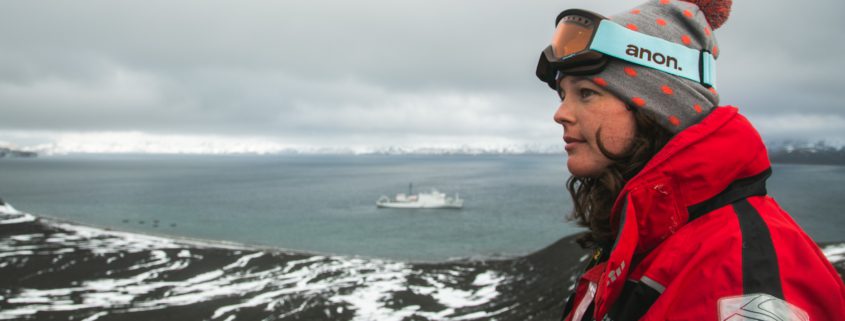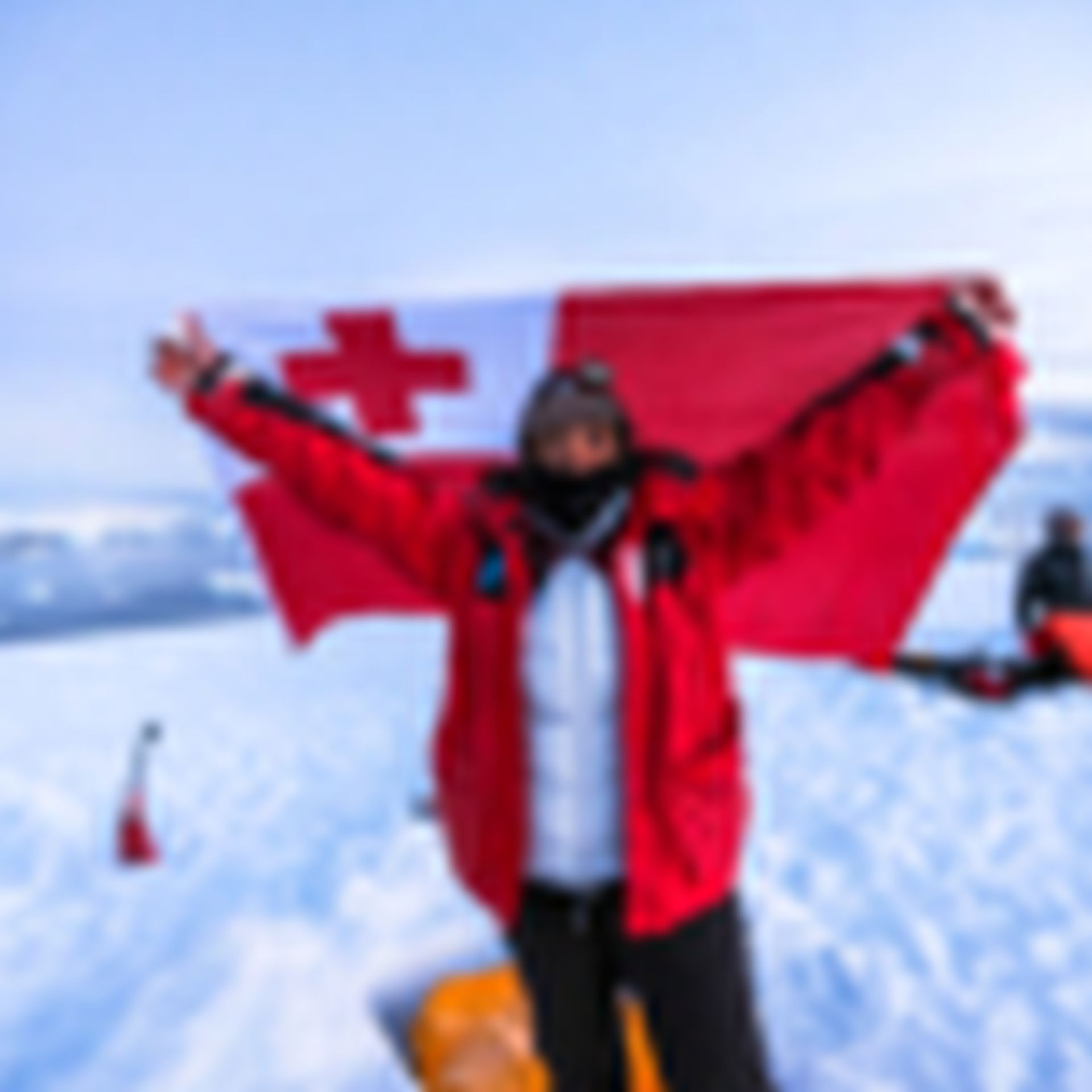Symphony of Sounds
After a short break and some time to process her experience in Antarctica, we caught up with Inspiring Explorer Georgina Archibald to get her perspective on the expedition, find out the highlights of the trip and the big challenges she faced.
What was your favourite part of the trip?
As one of the best two weeks of my life, it’s tough to narrow down a favourite moment to a single experience. One of them would have to be the overnight camping on Portal Point at Charlotte Bay. It was twilight and we kayaked in the evening light from the ship across to the ice, with fur seals playing next to the kayaks. We had to walk our gear up a small hill and then dig out our holes, ‘shallow graves’ our ship guide called them, put in our bivvy bag set up, and then jump in and zip up. All the while the sun was setting over this fantastic view of the bay, with the bluest of blue icebergs, glaciers, the ship in the distance outlined with lights, and then the soft pastels of the evening light – it was just beautiful. It had been overcast but once we were up on the hill, the clouds parted and there were just the most phenomenal views of the galaxy laid out above us. There was the Milky Way in sharp detail, punctured by shooting stars and slow-moving satellites. It was unreal. I didn’t sleep that much due to the cold but it was one of the best nights ever. Watching the sky, breathing in the sharp polar air, it was definitely a highlight for me. I think everyone was moved by the beauty of the ice campout.
What did you learn or discover about yourself?
It was a short trip filled constantly with really intense experiences, so while I would often want to keep moving and grab as many of the adventures on offer as possible—whether it be exploring the wildlife or the landscapes, or learning more about the history of Antarctica—I learnt that patience was really important. Patience in terms of taking the time to get the health and safety right in this extremely remote and sometimes hostile environment; patience in supporting the team at large to explore the region together at a group pace; and patience to also be still and appreciate the enormity of Antarctica’s environments, which really do stimulate all the senses.
Diary excerpt: Pulled the kayaks up on shore to get up close and personal with a colony of Chinstrap penguins, happy little hill climbers who are aptly named due to the helmet-strap dark band of feathers that run under their faces. Amongst all the Chinstrap penguins, nestled on steep cliff sides, sits Kenneth: a one-of-a-kind Macaroni penguin, his yellow bushy eyebrow crests a bright splash of colour amongst his monochrome friends, having deserted his species to move south to colder temperatures and make Antarctica his home. I am here for Kenneth, the total oddball who is flying his flag and marching to the beat of his own drum. Yankee Doodle came to town …
What went through your mind when you were arrived back in Ushuaia after 10 days aboard the Akademik Ioffe?
I was widely oscillating between Antarctica gratitude for the extraordinary experience I had just had, but also the Antarctic blues because I had to acknowledge that our expedition was almost complete and our team would be parting ways. I was also trying to process the enormity of those 10 days out on the water. Everything happens so intensively and quickly that there is not much time to reflect on what you are experiencing.
Diary excerpt: Up and at ‘em to the dulcet tones of OOE Expedition Leader Kaylan Worsnop’s morning wake up call over the ship’s intercom. Today is our first excursion launching in Antarctic waters! – and to grab an earlybird smoothie and some breakfast. The food is terrific on the Ioffe – hope the drysuit doesn’t get too tight by expedition’s end.
What was something you experienced that was different to your expectations?
I had been thinking I would be affected most by the sights of Antarctica because I’ve seen so much imagery of its grandeur, and landscapes, and wildlife. However, I was really surprised by the intensity of the sounds of Antarctica. It seems like there is such stillness and silence to the polar regions but then it’s really heightened by the constant sounds of water slapping against icebergs, and wind tumbling over vast vistas. You can hear glaciers calving into the sea, and there is the yelping and squawking of the wildlife everywhere – it was just unreal. There was a constant symphony of sounds. It also wasn’t as cold as I thought it would be when we undertook our shore excursions, but out on the water kayaking we did need all the technical cold weather gear we took. I really came to appreciate all the preparation that went on to keep us safe in what is a pretty extreme environment.
What was the most challenging part of the trip?
Strangely the biggest challenge for me wasn’t the kayaking or managing the cold, it was the constant feeling of being ‘green around the gills’ during the two-day Drake Passage crossings. I didn’t want to miss out on anything, and there was so much going on, including the awesome wildlife to see, passengers to meet, the ship’s lecture series, and I just wanted to be part of it all. But I did feel seasick often and it was a constant feeling of being off-kilter.
Diary excerpt: Not feeling so good and breakfast came back up. Like a penguin regurgitating food, but in this case my young chick is a purpose-constructed navy paper bag. A number of other passengers also seasick. Outside for fresh air, inside for team meeting, then bed for a nap. Several other teammates are feeling similar and it’s not going to be flash if waters ramp up closer to the famed Drake Shake as compared to these mild Drake Lake-ish swells.
When you go out and share your story, what will be the thing you want to share most?
I’m keen to share the story of the power of adventure and exploration for personal development, alongside key values of caring for our landscapes and caring for each other.
What other messages will you be giving to audiences about the trip?
For me, the whole trip highlighted the importance of the polar regions at a global level. The welfare of the world depends on the wellbeing of Antarctica at a profound environmental level, particularly due to its impact on our planet’s climate and ocean systems. We had the opportunity to learn about these issues in the ship’s lecture series and then on our outings. As New Zealanders we’re also particularly influenced by Antarctica’s history and politics, and its legendary and almost mythical status as the most hostile and awe-inspiring wilderness.
Diary excerpt: The Antarctic wildlife at Greenwich Island is simply magic. Fur seals lubber and roar on land and then sleekly glide through the water, Gentoo penguins with their distinctive white bandanas waddle and wave on the shoreline, various species of skua hang hungrily on wing, and humans squelch through the guano (penguin poop) that is liberally spread layers deep along the beaches. While the majority of the Ioffe’s passengers check out land, our team are able to kayak the shoreline and then head out further round the bay. My first excursion paddling through brash ice near towering mountains and glaciers, unbelievably beautiful! And the cold is CRISP yeow!
Quote of the day – “When I have lots of layers of clothes on, I just love to dance” – Marco de Kretser, boogying while bundling up for the increasingly cold outside temperatures.
What skills did you bring to the team, and how were you able to use those skills on this trip?
I think I’m a team player and over the years have grown my mentoring and problem solving skills. We had a really diverse group of individuals with a number of young teammates included. It was fantastic to be able to share what was really a once-in-a lifetime experience with one another. Each day amongst the wonder of what we were seeing, part of my role was to check in with teammates to see they were in a good headspace, ensuring they were connected in with the group at large and acting upon challenges or stresses that arose for others as well as myself. There was so much going on mentally as well as physically. It was really important for the team to be able to connect in each morning, which we did at a session that was usually led by Nigel or Mike, and most evenings if excursions allowed it, we connected in too. Challenges varied from physical things like a sore back from the kayak or a small slip on the ice, to more mental and emotional challenges like homesickness, or feeling overwhelmed by the amount of things going on.
A comment about the team itself?
What an amazing group of incredible New Zealanders. I’ve been blown away the passion and commitment and integrity demonstrated by everyone; the team dynamic has really enriched my polar experience. The ship’s passengers and staff were really interested in us and in our different backgrounds—they were shocked when they heard we had only just met each other!
Dairy excerpt: After a dinner full of passengers excitedly recounting the day’s events, we’re treated to a fireside chat in the bar from Harry Keys (OOE glaciologist) and Karen Williams (OOE historian), two Kiwis who met and married in Antarctica thirty years ago. I’m crying from the hilarity of their informal chat, where they regale us with stories of their courtship on The Ice and how they overcame distance, frigid weather on Erebus, and the threat of a dashing American helicopter pilot, to result in marriage.
Quote of the day – “As my mother said, the odds were good but the goods were odd!” – Harry Keys, One Ocean Expeditions glaciologist, recounting his wife Karen Williams’s probability for romance upon moving to work at Scott Base in 1978 where there was a ratio of 3 women to 60 men.
Would you recommend others apply for future expeditions and why?
Absolutely, go for gold in applying! This expedition and the diverse wildlife and landscapes I’ve experienced has definitely been life changing for me. To also be in the company of a team of such diverse young New Zealanders who are so passionate in their respective undertakings was a phenomenal experience.
Do you have any advice for future expedition members?
Take cameras and all your gadgets to help record the trip of a lifetime, but also remember to just put everything down and breathe in the atmosphere. It was when I was just sitting quietly in the kayak, especially in calmer waters, that I could appreciate the sheer scope of the glaciers, icebergs, cliffs and craters. There was also the pungent smells of all the marine life, and then all the sounds, such as penguin feet pattering across the pebbles, seals barking, and icebergs calving. These are all locked into my memory with feelings of such immensity in a way that photos and videos cannot do justice to it.


 Antarctic Heritage Trust
Antarctic Heritage Trust